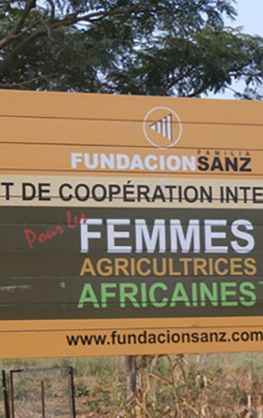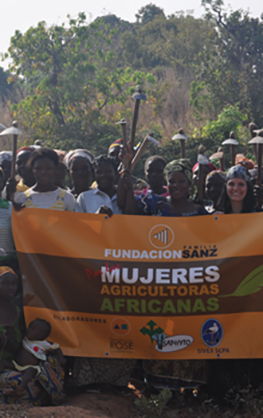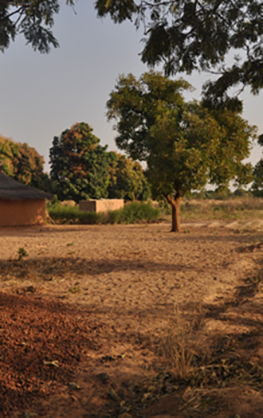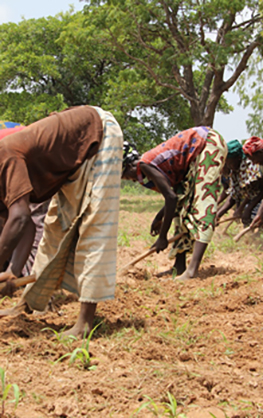Project “For African Women Farmers” of the Sanz Family Foundation
Beneficiaries:
The project will directly benefit a group of women and their families indirectly.
Goals:
Through this project we want to contribute to the empowerment of women in rural areas to encourage female entrepreneurship by including them in processes more diversified, efficient and sustainable agricultural production with commercial vision, through training, promoting the organization business, technical advice on production and marketing and the establishment of links with the local business, taking all this as ultimate impact also increased food security for the families of these women.
Precisely because women are the most disadvantaged social group in this country, and also those who support the family economy across the continent, Sanz Family Foundation has found in them a hub for the development of this region.
In order to go beyond the short term, which sometimes involve donations, this project contributes to training in agricultural techniques, guaranteeing them prosperity in the medium and long term, thanks to the knowledge of treatment of land, cultivation methods , product marketing, etc.
Thanks to this project, African women farmers in Burkina Faso are closer to achieving their social inclusion and educational development.
The Foundation expresses its commitment to contribute to poverty reduction in developing countries, promoting a model of sustainable human development-oriented international cooperation activities.
Status of Women in Burkina Faso
Difficulty of access to resources:
Access to land: In rural areas of Burkina Faso, at the level of families, communities or social groups, the decision-making power is consistently in the hands of men. Although 95% of women are engaged in agriculture, few women own land. They represent less than 6% of farmers.
Access to financing: To celebrate its weak economic power, the woman does not offer sufficient security to allow access to production credit.
Precariousness of life:
In areas where the environmental conditions of life (natural resources) show a very advanced degradation, male migration leads to male rural population to urban centers, and some neighboring countries in the region. This forces women to play a key role predominantly for the survival of the family. They become the “head of household”, increasing thus their responsibilities, but does not change his status at home, or in the Community.
Socio-cultural situation:
Despite the diversity of socio-cultural groups in Burkina Faso, a number of factors constitute the common denominator of women in rural areas.
Status: the social status of women always maintained in a range inferior to men, making it dependent on it.
Marriage: In many social groups, marriage in rural areas is always the result of an “agreement” between families. The wife can not give their opinion, and very often does not know her future husband.
Access to the labor market:
In rural areas, 93% of the population is occupied, 45.9% men and 54.1% women. Most employees consists of 79.9% men versus 20.1% women.
Education (school enrollment, literacy training):
According to the strategic framework to combat poverty in Burkina, delayed enrollment of women is a real obstacle to their participation in the modern sector. Only they represent 21% of the staff of the public administration, and 5% in private companies in the modern sector.
Bless you:
Although the right to health is guaranteed to all by the Constitution in general terms, in Burkina Faso, the health status of the population is worrisome. The situation of women, particularly in terms of health and nutrition remains precarious despite the reduction in the rate of maternal mortality. The explanatory factors of the health status of women are generally malnutrition, early pregnancy, poverty, the burden of domestic activities, harmful traditional practices, AIDS, inadequate sanitation measures and water supply, etc. ..











